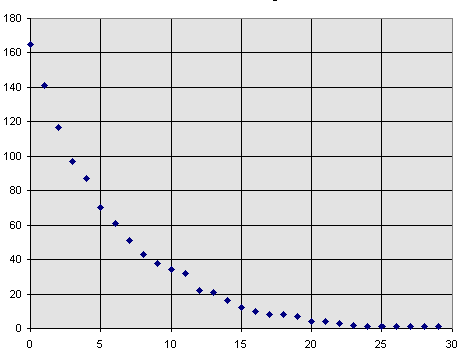I was actually first introduced to Marxist crisis theory while reading a fantasy novel, Perdido Street Station, by China Miéville. My simplistic one-liner about crisis theory is that it predicts that increasing prosperity actually diminishes the ability of labor to produce the same amount of profit, inevitably leading to a clash between capital and labor. But mathematically speaking, what this means is that the normal progression of a capitalist economy starts off high, but steadily declines, eventually approaching 0 asymptotically (although never actually reaching zero). There is probably a critical point where crisis occurs, and wealth becomes redistributed in some manner (usually violently.) This restarts the engine of capital expansion, which again inevitably declines.

The human mind has no real way to intuit non-linear processes. By definition, these non-linear breaks are typically unpredictable. Hence, we end up with mathematical singularities. These singularities are where human knowledge and theory break-down, and they are present in all fields, from cosmology to technology to economics. Around and during the singularity, all known rules breakdown.
Ambitious physicists involve in cosmology believe that if they delve deeply enough, they might be able to describe these singularities, or perhaps even prove that they don’t really exist. Of all the fields, perhaps, they have made the farthest progress in trying to understand non-linear processes, but again, that knowledge is incomplete.
We just don’t understand the nature of processes that can’t be normalized to a straight line.
But I suspect that the singularity will forever remain unfathomable, except maybe in the retrospectoscope. We may very well eventually understand the history of the Big Bang at some point, but I don’t think we’ll ever be able to successfully predict what will happen to the matter in a star after it collapses into a black hole.
It is interesting that so many apparently disparate fields can share the same mathematics. I was first impressed by this when I was taught the equations and graphs for exponential growth. Phenomena as diverse as the number of bacteria growing in a Petri dish, the number of radioactive particles in a chunk of uranium, and even the accumulation of compound interest can be modeled by these equations.
But humans seem to be most able to deal with equilibrium situations, or at least steady-state situations. When the slopes of these equations are the steepest, at the beginning of the growth or decay processes, we probably have the least amount of knowledge. When you are in equilibrium, any perturbation still favors the equilibrium state. The steady-state is more fragile. While some perturbations can still be rectified, others will cause the system to crash.
In these phases of rapid growth or decay, it is exceedingly difficult to predict what effect a perturbation will have. This is where evolving systems are most vulnerable. Too much a perturbation and the system will crash entirely.
Interestingly, what a capitalistic economy probably most resembles is the cyclic model of the universe, in which the universe experiences multiple cycles of big bangs followed by accelerating expansion. One way to look at such a universe is to imagine the plot of logarithmic decay (representing the vacuum energy as a function of time) repeating continuously, with a disjunct at the end of the acceleration phase. Here (again, still a mathematical singularity, unless you extrapolate to additional dimensions, I guess) the system resets.
Similarly, each cycle of capitalistic expansion eventually stagnates, until a crisis occurs (like the Great Depression, or WWII, etc., etc.) at which point the system resets, driving yet another cycle of economic expansion.
The laws of thermodynamics decree that both the universe and the global economy will always trend towards a state of lowest energy. In the case of the universe, it is vacuum energy that necessarily decays. In the case of the economy, what decays is the profitability of capital. This is encapsulated in such observations as the law of diminishing returns, and specific situations as illustrated by the Singer-Prebisch thesis.
I think thermodynamics is the biggest argument against a completely laissez-faire economy, because if you let the Invisible Hand manage things, the economy is guaranteed to always end in the shitter, usually in a catastrophic manner. I’m not saying that planned economies can actually prevent these catastrophes, but they can probably shepherd us through them in a more controlled fashion. If the analogy is to an explosion, laissez-faire would have all the pieces scattering all over the place, while a planned economy would be like an internal combustion engine.
